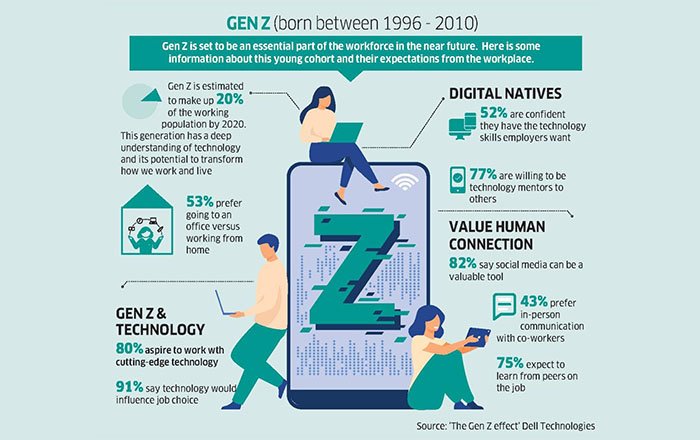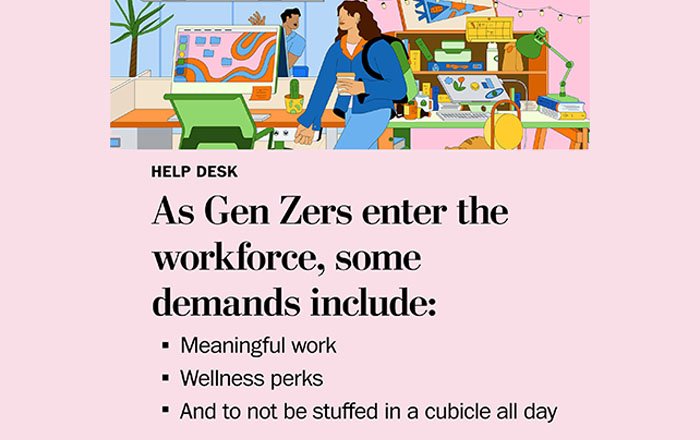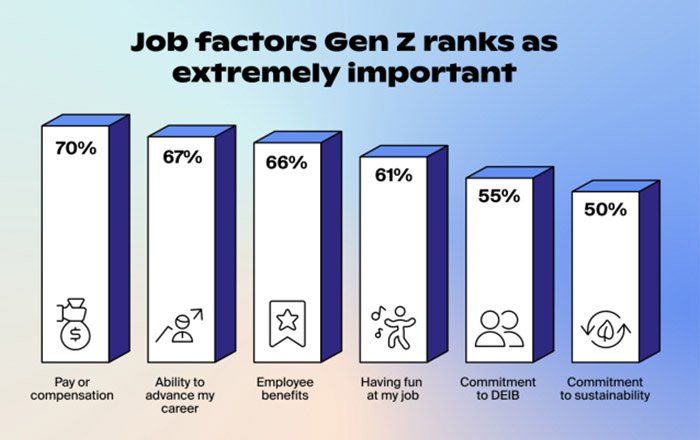Gen Z’s Influence on Hiring Practices

Generation Z, defined as people born between the mid-1990s and the first two decades of this century, is on the rise both nationally and globally. As Gen Z makes a larger presence within the job market, understanding their preferences in hiring starts to become more important for employers.
It is necessary for businesses to adapt these aspects of their recruitment strategies if they ever wish to effectively prioritize Generation Z talent and create a successful competitive advantage.
In this blog, five ways Gen Z preferences are shaping hiring will be discussed while addressing predetermined challenges and opportunities posed by them. By gaining an understanding of these preferences marketability it helps ensure companies strive to surround themselves with he most capable and suitable multilayered talent.
Relevance of Gen Z Preferences in Hiring

Growing presence of Gen Z in the workforce
As Gen Z forms an increasing portion of the labor force, employers and recruiters must become familiar with their unique preferences in order to effectively attract and retain talent.
According to a Deloitte survey, nearly 40% of all U.S. workers will come from Gen Z by the year 2023 — making it increasingly important for employers of any company size to be aware of this new generation’s needs when building out job descriptions or trying to sell the value of the listing.
In addition, Deloitte estimates that Generation Z is twice as likely than Millennials to consider software engineering/development as the top three dream jobs — another key statistic that companies can leverage in their hiring efforts.
All generations have their specific expectations and motivators when considering employment opportunities and businesses would profit by supplementing traditional hiring efforts to hone in on what a contemporary millennial workforce requires.
Highlight the unique characteristics and values of Gen Z
Gen Z typically defines the population born between 1995 and 2015, consisting of tech-savvy, hyper-connected “mobile natives.” Gen Zyers tend to approach life with optimism and collective collaboration as many strongly value working as a team.
They prioritize personal growth through mentorships rather than conformity in their careers. Their integrity for societal causes holds practices among corporations high when hiring or evaluating individuals.
Given their continuous dialogue on digital platforms across regions on varied socio-political issues nurtured from a young age, this generation ceaselessly brainstorms innovative practices to make heads shake at how difficult their parents considered life decisions just years ago!
Five Ways Gen Z Preferences Are Shaping Hiring
1. Flexibility in work arrangements

Gen Z seeks a greater emphasis on flexible work options. These digital natives realized the benefits of having freedom and autonomy when completing tasks remotely.
They greatly value their free time, which often increases their productivity when participating in extracurricular activities or engaging in self-care and creative endeavors.
With burgeoning technology, more companies are able to accommodate different schedules, and allow remote access for projects, giving those with busy an unpredictable lifestyles a larger portion of day-to -day flexibility in their lives.
This helps ease daily stressors that ask them to strike a balance between limitless times compared to static hours with little room for spontaneity Technology not only gives Gen Z confidence they’ll find employers they’re compatible with its also further created incentives and shifts back workplace culture.
2. Emphasis on company culture and values

Gen Zs are characterized by strong values and a detail-oriented approach to job selections. They demand workplace cultures that reflect their values whilst recognizing both diversity and inclusivity for employees hailing from different backgrounds, genders, races, and religions.
Gen Z is often idealistic in their nature looking for companies that have clear environments and respect for their civility or peaceful conduct.
They enthusiastically highlight the behaviour stakeholders take depicting sensitive concern regards matters providing an emotional attachment.
Impact of company culture on attracting Gen Z candidates
Company culture is an important concept for Gen Z when assessing job opportunities. Gen Z is striving to match their own values with the core values of potential companies to work for, and ensure workplace diversity and equitable policies.
To appeal to this generation, organizations need to practice inclusion in a meaningful way across staff composition, promotional practices, operational decisions, marketing initiatives, etc., that reflect the triple benefits of respecting differences in age, race/culture/ethnicity/ gender orientation combined with infinite skills needed from candidates applicants.
3. Personalization in the hiring process

Personalization in the hiring process is highly valued by Gen Z individuals; they prioritize companies that take the time to learn about candidates and create a personalized experience for each job seeker.
To accomplish this, many employers are harnessing technology and data-driven hiring processes to tailor and accelerate their approach.
While implementing personalized features at scale may present unique challenges due to cost considerations and manpower requirements, many fresh talent strategies prove how technology investments can lead to more satisfied employees, increased productivity, profitability upside potentials, improved competencies- skyrocketing recruiting results as well as incredibly high levels of personal satisfaction for everyone involved.
Use of technology and data to tailor the hiring process
Organizations are utilizing technology to customize and personalize the hiring process to meet Gen Z expectations.
Automated applicant tracking systems, combined with advanced artificial intelligence algorithms, provide personalized communication throughout candidate sourcing, pre-screenings, on-site interviews and offers.
This insight enables employers to contextually engage with younger applicants through automated career pathing features that notify individuals about new job openings which fit into their desired lifestyle criteria or professional skillset requirements.
Similarly, trend reporting of year-over-year recruitment effort level helps quantify candidate sentiment towards their unique job offering.
4. Embrace of diversity and inclusion

Gen Z is highly conscious of serving a diverse population and finds value in creating legacies built by those that have come before them. They are passionate about making sure all voices, from minorities to women to people with different disabilities and sexual identities, are truly included in daily practices.
Gen Z typically has expectations when it comes to inclusion of age, gender identity, ethnicity, race, disability, or other differences in the workplace throughout both their organization’s hiring process as well as its employment processes more generally.
Companies that embrace diversity and inclusion try their best to create much-needed additional spaces for these historically underrepresented groups which can boost staff morale & commitment, leveraging growth opportunities to support lasting success for everyone involved.
Adapting their hiring practices to foster inclusivity
Gen Z is highly conscious of serving a diverse population and finds value in creating legacies built by those that have come before them.
They are passionate about making sure all voices, from minorities to women to people with different disabilities and sexual identities, are truly included in daily practices.
Gen Z typically has expectations when it comes to inclusion of age, gender identity, ethnicity, race, disability, or other differences in the workplace throughout both their organization’s hiring process as well as its employment processes more generally.
Companies that embrace diversity and inclusion try their best to create much-needed additional spaces for these historically underrepresented groups which can boost staff morale & commitment, leveraging growth opportunities to support lasting success for everyone involved.
5. Focus on career development and growth

Gen Z is interested in professional career development and seeks continuous growth opportunities.
These young professionals value continuing education in order to stay current with the latest trends, “soft skills” positions for increase problem-solving capacities, and also international residency or rotational programs linking different operation models around the globe.
Gen Z’s desire for constant learning within the professional sphere creates a unique opportunity for businesses to appeal to these pursuits while offering progression and preventive support in an ever-changing job market utilizing profession-oriented apprenticeships or internships.
Providing growth opportunities to attract Gen Z candidates
Providing opportunities for internal career development and growth is an attractive quality to Gen Z candidates when applying for jobs. These young professionals desire positive progress in their work life, from learning something new on the job or gaining access to workshops that provide higher qualifications and skills.
Since the traditional workplace hierarchy isn’t preferable in many cases, businesses should strive for laying out alternate paths of advancement such as having open communication between managers and mentees that focus on aiding progression rather than the perception of control.
Career development goes hand-in-hand with the side investment by employing competitive wages which only aid in fostering commitment and loyalty among Gen Z applicants.
Challenges and Opportunities for Employers
Address the potential challenges faced by employers in adapting to Gen Z preferences
Recruiting, selecting, and integrating Generation Z into the workplace present some unique challenges as well as opportunities for employers.
Challenges include the ability to provide digitally native processes, offer flexible working arrangements, quick decision making timelines, customization in employer brand approaches, and other characteristics specific to this generation of candidates.
Adapting successfully to candidate needs from Gen Z requires staying current on technology trends, being nimble while recruiting with multiple overlapping processes running simultaneously in parallel, and providing different arms of an organization’s outcomes versus initiatives-based results quickly at any given time.
Opportunities for companies to thrive by embracing these preferences
Although adapting to Gen Z preferences presents potential challenges, there are opportunities for companies to benefit in the long term.
Employers that are able to embrace these unique requirements and provide meaningful experiences can reap incredible rewards from the enthusiasm and vibrancy of youth culture present with Gen Z.
The adoption of flexible schedules, value-driven mindset, tailored recruitment process, promotion of diversity and inclusion and emphasis on career growth have shown successful findings serve as surefire ways for utilizing the energy that this new way brings to an organization – creating effective teams ready to succeed.
Conclusion
Gen Z’s preferences are significantly shaping certain elements of recruiting. Companies that wish to remain competitive in terms of attracting Gen Z workers must create flexible work features, focus on diversity and inclusion, emphasize company culture and values, personalize their hiring processes more, and offer career growth opportunities.
By including such measures as well as thinking creatively serving the industry standard in relation to these qualities, employers can anticipate possible challenges but also seize opportunities where others may be competing against one another and establish a thought leadership presence which considers principles important to Gen Z applicants within their organizations.
- Mastering Internal Mobility: A Comprehensive Guide to Success - August 10, 2023
- Effective Recruiting Strategies in a Competitive Sales Labor Market - July 27, 2023
- 6 Essential Factors to Attract Top Talent - July 19, 2023
